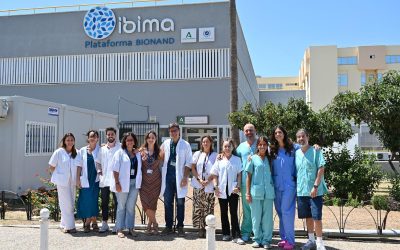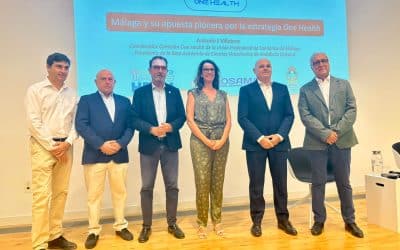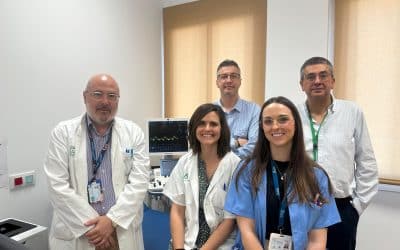The funds raised by the IBIMA BIONAND Platform in clinical trials, projects and donations have tripled since 2012 to 30 million
Research is the only way to improve care. And this is what they are currently doing more than 1,100 professionals in the province. There are, among others, doctors, nurses, biologists, chemists, engineers, computer scientists... All joining forces to find solutions to everyday problems; be it to improve a treatment, find a drug, design a device or understand the origin of a pathology.
El Biomedical Institute of Malaga (IBIMA Plataforma BIONAND) is the institution that supports all of them. Some work full time and others are professionals from public health centres in the province and from the University of Malaga who form part of the team. groups operating under its umbrella.
IBIMA BIONAND Platform celebrates its 12th anniversary. In that time, he has not only succeeded in getting the biomedical research in Malagabut also to consolidate it. Compared to 243 researchers in 2012, the number of researchers now stands at 1.104; i.e. that have quadrupled. Of the total, 56% are women. Fundraising from projects, clinical trials and donations has increased by tripled from just over 10 million at the beginning of the IBIMA BIONAND Platform to 30 million last year.
Nuestro Instituto ha crecido sobremanera. En una década se han cuadruplicado los investigadores y se han triplicado los proyectos y ensayos clínicos.
Ese es nuestro reto, continuar avanzando en investigaciones, así como aumentando el número de patenteshttps://t.co/EGGCaTqfz2
— IBIMA – Plataforma Bionand (@_ibima) April 1, 2024
Another indicator to measure the strength of biomedical research in Malaga is the impact factor of scientific production. In this period it has risen from 1,224 to 5,546 in 2023. And there are more numbers:73 research groups, 1,083 clinical trials, 242 active projects, 52 patents and 878 scientific publications.. Out of 73 research groups, 18 belong to Bionand.
‘We have made a giant leap forward, but there are still opportunities for improvement,’ says the scientific director of the IBIMA BIONAND Platform, Francisco Tihanones. He adds that compared to twelve years ago, ‘there is no colour; researchers have won and patients have won’.
Until the creation of this structure, the researchers were almost quixotic who did assistance, did research in their spare time, had to deal with the paperwork to get funding for their projects, and even had to process a lot of statistical data to draw conclusions.
The IBIMA BIONAND Platform is a support for which includes, among others, a project management area for applying for grants, an international area for fundraising outside Spain, and even a statistics area for processing thousands of data. This coverage allows researchers to focus on their projects. ‘Before, it was done on a voluntary basis. Now there is a certain professionalisation, explains Tinahones.
This certain professionalisation is possible because the tandem IBIMA BIONAND Platform ofrece el It offers the support from administrative and other researchers who, as a team, turn projects into reality. For example, engineers help with data processing and also in the construction of prototypes. This was the case with the respirators produced during the pandemic.
This structure covers the research groups. Before, each researcher had to do everything on their own. This has been the key to the take-off, first, and then the consolidation of biomedical research in Malaga. Its pillars are the UMA, the public hospitals, IBIMA Plataforma BIONAND and the PTA.
In mid-March, IBIMA Plataforma BIONAND celebrated its 12th anniversary. One of its milestones in this time has been the internationalisation of the science it produces. The publications are heavily cited in other research. ‘They have a high impact. What is produced here is valued by other researchers around the world,’ Tinahones summarises.
. What is produced here is valued by other researchers all over the world. Moreover, there are researchers at the IBIMA BIONAND Platform who are European leaders in certain areas,’ summarises Tinahones. Allergology, Oncology, Endocrinology or Cardiologyamong others. A research team in the latter medical field has won an ERC grant of 1,5 millón for a project being carried out in Malaga.
Tinahones stresses that in little more than a decade, IBIMA Plataforma BIONAND has established itself as one of the most important institutes in the country. ‘IBIMA Plataforma BIONAND is already being talked about nationally and people know that it 2.5 million from the Fortalece programme granted to it by the Carlos III Health Institute. An achievement that has not been easy because the Malaga centre has had to compete with other well-established centres in Catalonia, Madrid and the rest of Spain.
The inventory of these 12 years includes 52 patents in force. ‘That means a lot of innovation and that what is being discovered may have applicability’.can have, emphasises the scientific director of IBIMA. They can be for a new treatment, an industrial development or a diagnostic test. And for the Institute, they can represent an economic income. Although at the moment, the proportion of what they represent in the total funds is still very low’.
This is precisely one of the challenges The challenge for the future is to increase the profitability of patents. Another challenge is to increase donations. The researchers agree that patronage is not very well developed in Spain, compared to other European Union countries and especially the United States, where its proportion of total income to support research is much higher. ‘And another challenge is to attract more international projects, especially at the European level,’ Tinahones says.
The building of IBIMA BIONAND Platform is in the PTA. There you will find special equipmentThe most important of these are a spectral cytometer to separate the cells or a multiphoton for a better view of the tissues. And there are many other devices. Almost all of them have unpronounceable names and functions that are even more incomprehensible to non-health professionals. But what is clear is that it is on the determination of its researchers and their concerns that the progress of the future assistance.
-News elaborated by Málaga Hoy
Tags 12 años • FIMABIS • IBIMA BIONAND Platform • investigadores



